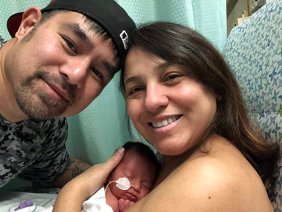In Vitro Fertilization (IVF) Treatment
In vitro fertilization, or IVF, is one of the most well-known treatments to overcome infertility. IVF is a highly successful treatment option that involves stimulating the ovaries to produce multiple eggs, retrieving those eggs, fertilizing them with sperm in a laboratory, and then transferring one or more embryos into the uterus.
Request an AppointmentWhen should IVF be considered?
IVF is often recommended to patients with:
- Advanced maternal age
- Male factor infertility
- Recurrent miscarriage
- Unexplained infertility
- Endometriosis or blocked fallopian tubes
- Inherited genetic disorders
- LGBTQIA+ individuals and couples
The IVF Process
We are committed to making the IVF process as smooth as possible while ensuring the highest standards of care. Here’s what you can expect when you begin your IVF journey with us:
1. Ovarian stimulation
To prepare for egg retrieval, you’ll take injectable medications to stimulate your ovaries to produce multiple eggs. We’ll monitor your progress with frequent ultrasounds and blood tests, ensuring that your treatment is tailored to your body’s response.
2. Egg retrieval
Once your eggs are ready, we perform a minimally invasive procedure to collect them from your ovaries. You’ll be comfortably sedated during this short, outpatient procedure.
3. Fertilization
In our state-of-the-art laboratory, we’ll combine your eggs with sperm to create embryos. For cases where sperm quality is a concern, we offer ICSI to improve fertilization rates.
4. Embryo development
We carefully monitor embryo growth over 3 – 6 days, selecting the healthiest embryos for transfer.
5. Embryo transfer
Once the embryos have developed, one or two may be transferred to your uterus in a quick, painless procedure. Any additional high-quality embryos can be frozen for future use.
6. Pregnancy test
About 10 days after your embryo transfer, we’ll perform a blood test to confirm pregnancy.
Using ICSI with IVF
What is ICSI?
Intracytoplasmic sperm injection (ICSI) is an advanced lab procedure used during in vitro fertilization (IVF) to improve fertilization when male factor infertility is present. Instead of combining eggs and sperm in a dish as in traditional IVF, a specialist injects a single sperm directly into a mature egg, increasing the chances of fertilization.
If a semen analysis indicates ICSI is necessary, the couple proceeds with IVF. On average, about two-thirds of eggs injected with sperm successfully fertilize and develop into embryos. Any high-quality embryos not transferred can be frozen for future use.
Who can benefit from ICSI?
ICSI is recommended for individuals or couples experiencing:
- Preimplantation genetic testing (PGT), as ICSI helps prevent sperm contamination of genetic results
- Severe male factor infertility, including low sperm count (oligospermia), poor motility, or abnormal morphology
- Azoospermia (no sperm in ejaculate) due to vasectomy, blockages, or production issues
- Previous IVF failure, where traditional fertilization methods were unsuccessful
Age Guidelines
In accordance with guidelines established by the American Society for Reproductive Medicine, the Reproductive Science Center of the San Francisco Bay Area:
- For patients age 49 and over who already have frozen embryos in storage, embryo transfer is recommended by age 51 but available up to their 52nd birthday.
- Accepts new patients before their 50th birthday.
- Offers IVF for patients who want to use their own eggs up to their 46th birthday.
- Offers IVF for patients who want to use fresh donor eggs up to their 51st birthday.
Success Rates
We take pride in our exceptional success rates, which consistently rank among the best in the country. Success varies based on several factors, including age, overall health, and the cause of infertility. We are proud to give families the best possible chance of growing their families.
View IVF Success Rates →Patients share their IVF success stories
Patient Story
Abra & Ari
Patient Story
Diane & Ian
Patient Story
Elizabeth
Patient Story





